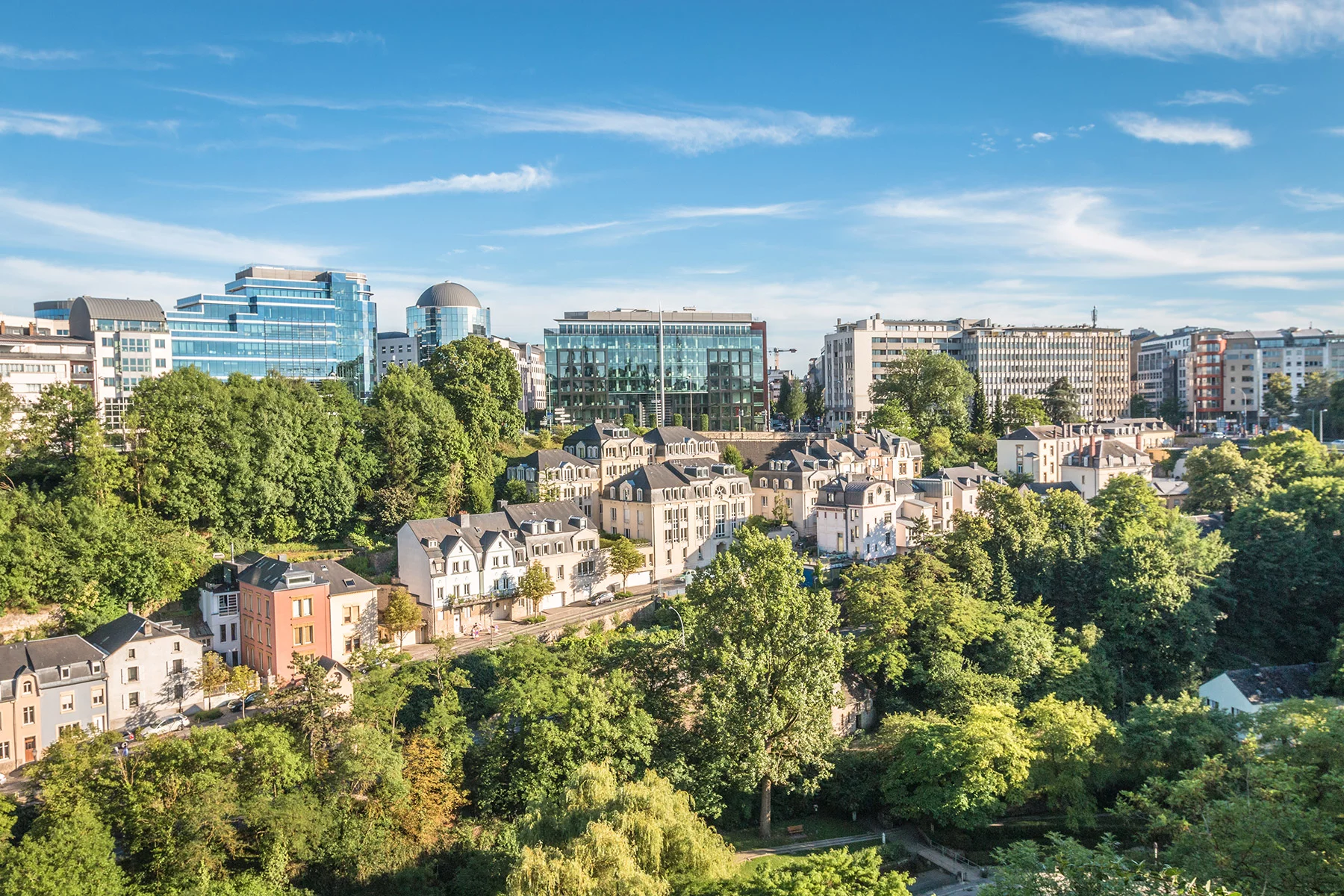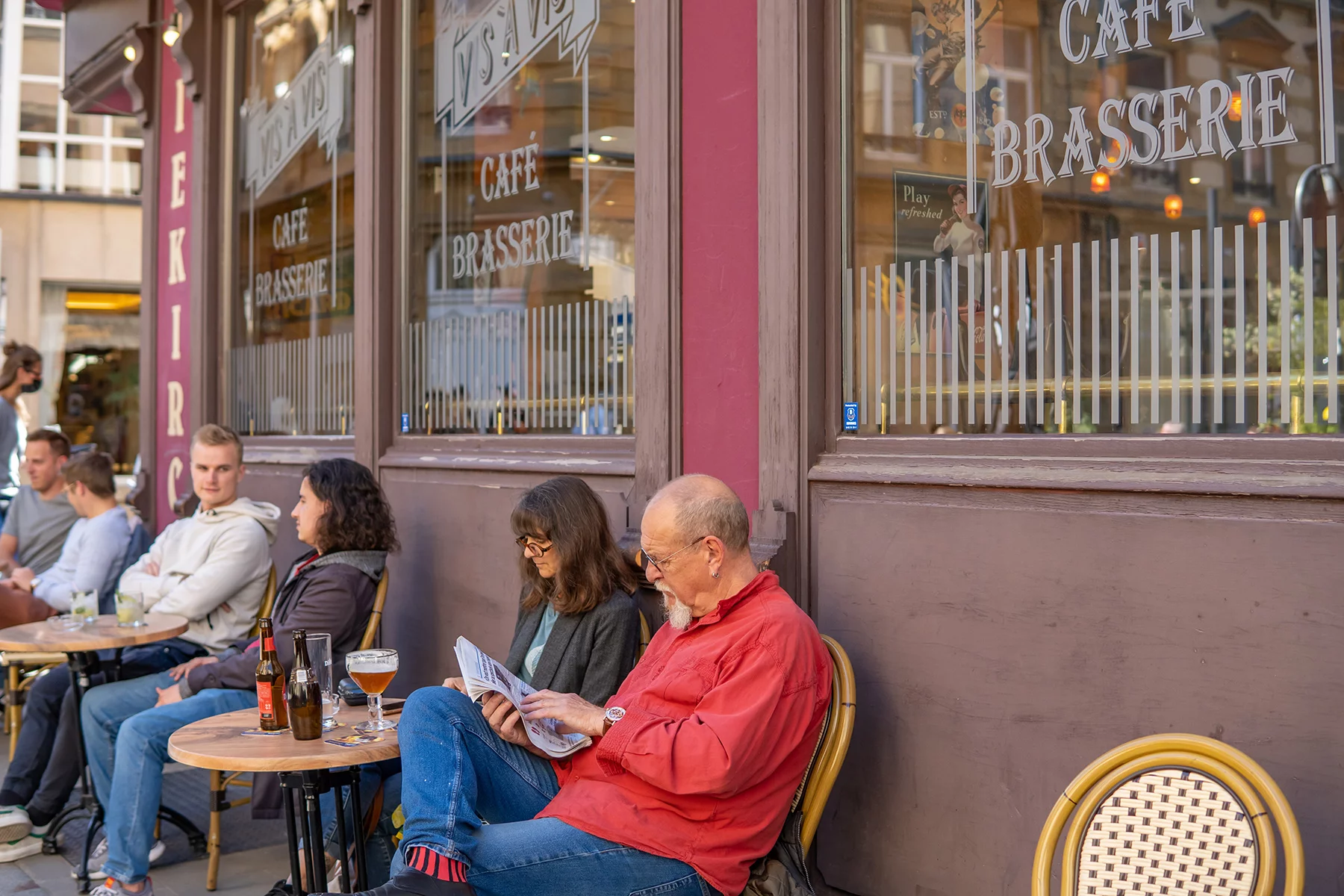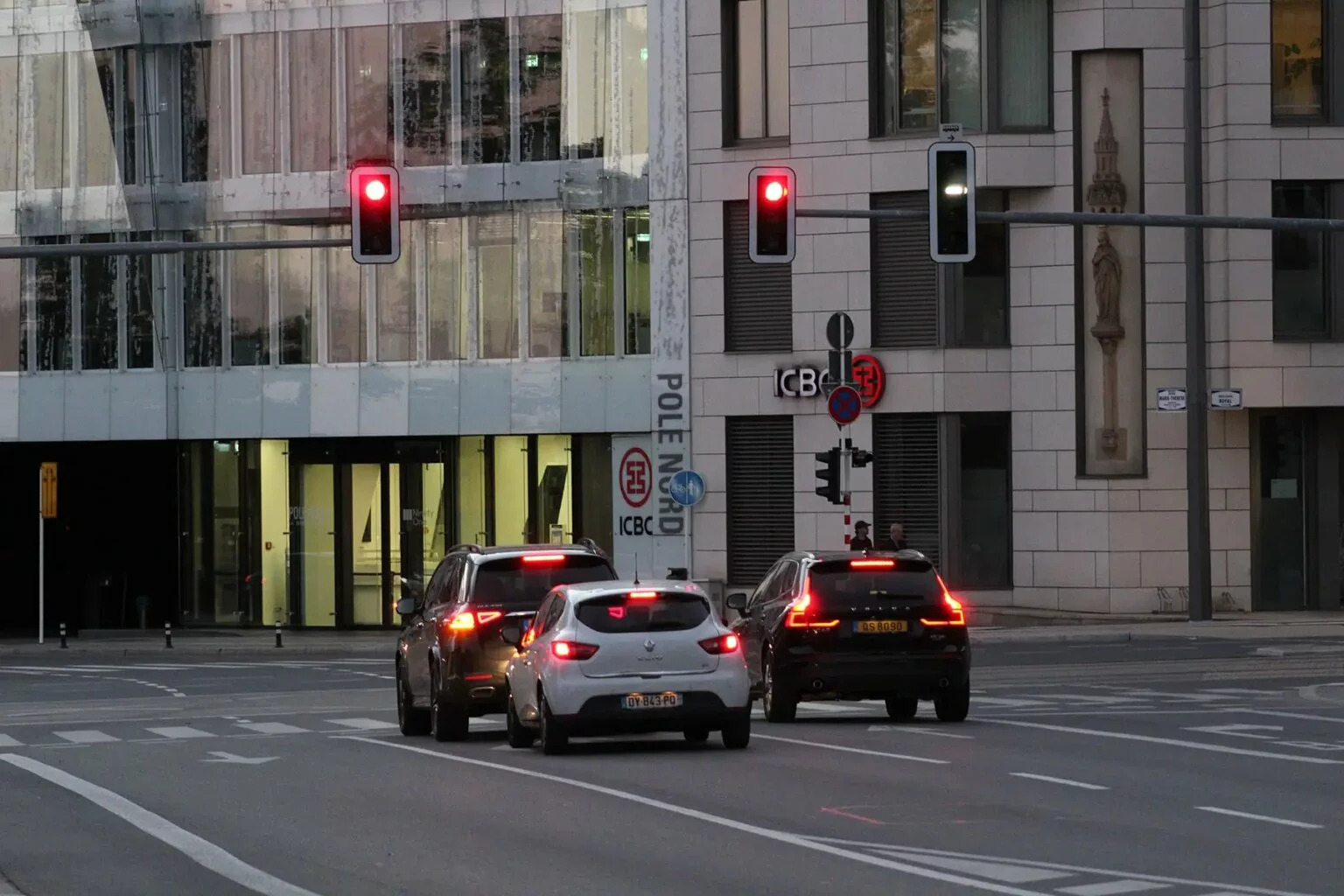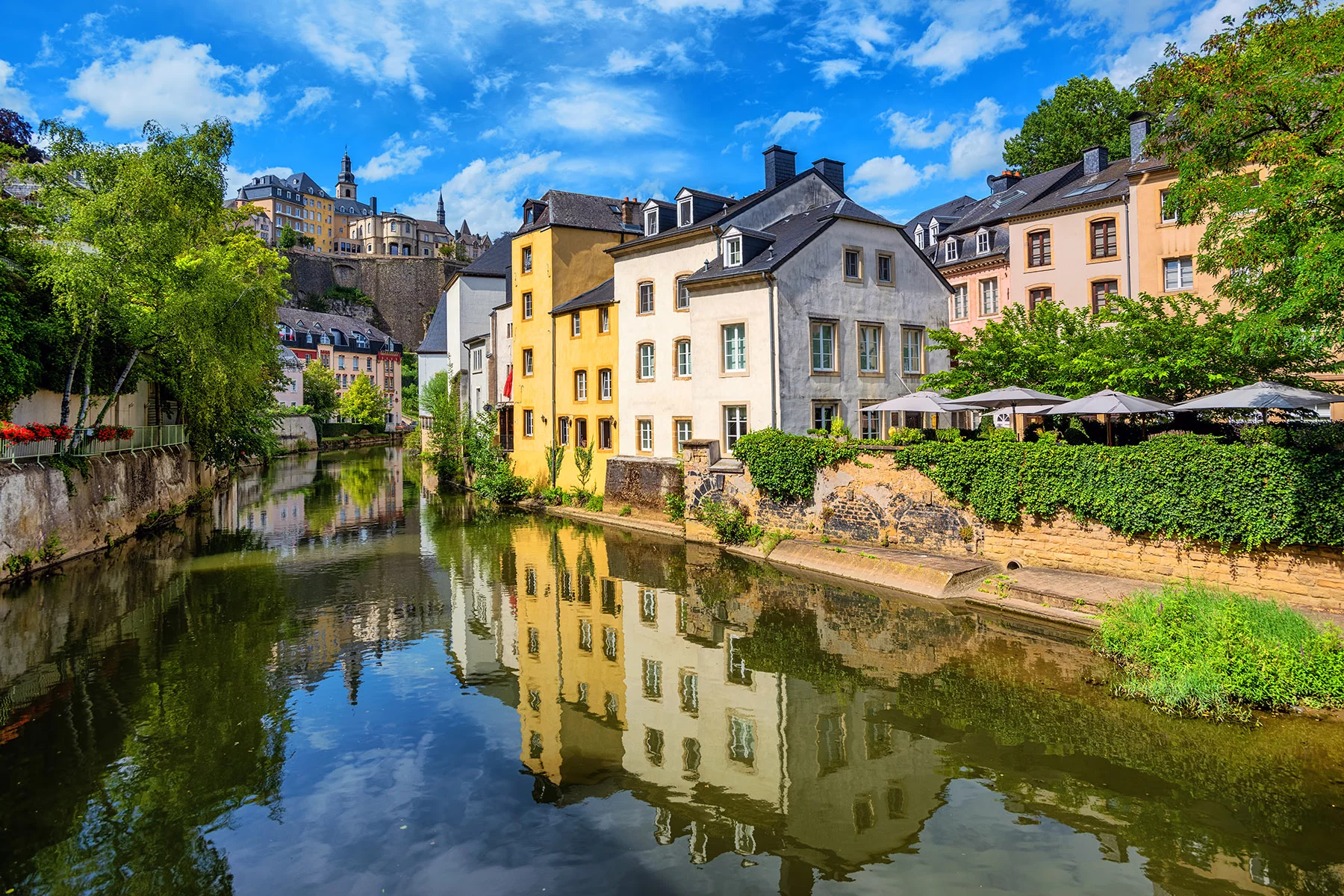With the highest minimum wage in the world and a negative gender gap (where women’s hourly pay exceeds that of men’s), Luxembourg is a great place to bring home the bacon. But how does the country’s living expenses stack up?
Whether you’re relocating for work or lifestyle reasons, you’ll need to manage your finances efficiently, including any international money transfers between Luxembourg and your home country. Multi-currency accounts like Wise can help you manage your finances easily. More on that later.
From everyday costs like groceries and utilities to housing and healthcare, here’s a clear picture of the cost of living in Luxembourg and help you prepare for your new adventure.
Continue reading for the following information:
- Is Luxembourg’s economy good?
- The cost of living in Luxembourg in 2025
- The price of groceries in Luxembourg in 2025
- 2025 housing costs in Luxembourg
- The cost of healthcare in Luxembourg
- Internet and telecom prices in Luxembourg
- The cost of clothing and footwear
- The cost of transportation in Luxembourg
- How much does leisure and entertainment cost?
- The cost of education and childcare in Luxembourg
- Loan repayments in Luxembourg
- How does Luxembourg compare to the rest of the world?
- Financial support for the cost of living in Luxembourg
- Tips on how to save money in Luxembourg
- Useful resources
Wise Account
Are you an expat or thinking of moving to Luxembourg? Managing your money across borders shouldn’t be complicated. With a Wise account, you can hold over 40 currencies and pay with a Wise debit card in more than 150 countries. Whether you’re using spending abroad, receiving or sending money home, Wise can help make international money management simpler.
Is Luxembourg’s economy good?
Luxembourg is the richest country in the world (IMF, 2024). Its gross domestic product (GDP) is €79.3 million (2023), which the European Commission predicts will grow by 1.4% in 2024 and 2.3% in 2025, slightly above the EU average of 1.0% and 1.6% (respectively).

Inflation and disposable income in Luxembourg
“Hang on,” some of our international readers might think. “Germany is the largest economy in the EU with a GDP of €4.12 billion, and the US has a total GDP of US$28.8 billion. How is Luxembourg the richest country?”
Indeed, it is all a matter of perspective. The Grand Duchy’s GDP works out to €119,984 per capita (2023). The equivalised disposable income (i.e., the total net income of all household members divided by the weighted number of household members) is as high as €47,636 per person. This massive amount eclipses the EU average of €20,350 per person, as well as Germany’s average of €26,274 per person.
Indeed, only 6.9% of Luxembourg’s population is at risk of poverty. Around 3.3% of people can’t afford a meal with meat, chicken, fish, or a vegetarian equivalent every second day. Comparatively, 12.4% of Americans live in poverty (2022), while 12.5% of US citizens have sometimes or often not enough to eat (2023).
The discrepancy is likely explained due to Luxembourg’s incredibly high minimum wage standards. Read more about this topic in detail, as well as the average salaries and incomes, in our dedicated article.
In terms of purchasing power, Luxembourg’s average headline inflation for 2025 is projected to be 2.3% (just below the EU’s average of 2.4%). This figure is likely to decline to 2.2% in 2026, slightly above the 2.0% average for the EU.
The cost of living in Luxembourg in 2025
According to the latest government data, the average household expenses were €63,016 per year, or €5,251 per month (2022). This amount excludes any possible loan repayments. Considering the 2023–2025 inflation rates (2023: 2.9%, 2024: 2.3%, 2025: 2.4%), it’s recommended that your household budget have at least €5,661 per month.
Naturally, the cost of living spending per age group in Luxembourg differed somewhat. For example, in 2022, those under 25 spent an average of €2,952 per month, while people above 64 spent €5,719 per month.

Interestingly, the average household spending also varied by nationality:
| Nationality | Annually 2022 | Annually 2025 | Monthly 2025 |
| Belgian | €58,472 | €63,029 | €5,252 |
| French | €59,418 | €64,049 | €5,337 |
| German | €47,890 | €51,622 | €4,302 |
| Luxembourgish | €69,625 | €75,051 | €6,254 |
| Portuguese | €53,977 | €58,183 | €4,849 |
| EU nationals | €55,466 | €59,789 | €4,982 |
| Non-EU nationals | €50,708 | €54,660 | €4,555 |
Keep reading for an overview of the cost of living expenses you might come across in your daily life.
The price of groceries in Luxembourg in 2025
Beer, wine, and liquor
With its vineyards overlooking the river Moselle, the Grand Duchy is best known for its white wines, including Riesling and Crémant de Luxembourg. However, there are also a number of local lagers that can satisfy many a beer lover.
Luxembourgish drinkers consume around 10.6 liters of pure alcohol per year (2020), with most people preferring wine.

In 2025, households will spend an estimated average of €75 per month on alcohol, tobacco products, and narcotics (Luxembourg: €78, EU nationals: €51, non-EU nationals: €82).
A half-liter beer in a bar or restaurant will set you back about €5–8, while a glass of wine costs around €6–9. The price of cocktails can go up to €16.50.
Of course, alcohol is much, much cheaper in supermarkets. You can expect to pay as little as €0.75–1.70 for a beer, depending on the size and make. A decent mid-range wine costs around €5–8 per bottle. The price of most liquor (e.g., Aperol, gin, or whiskey) starts from €9.50, depending on your drink of choice.
Food and drink
People in Luxembourg do not spend a lot on food and non-alcoholic drinks. Groceries present around 10% of the monthly budget. By comparison, households in Belgium spend roughly 13.5% of their income on food (2022). This figure is 11.8% in Germany, 13.6% in France, and 15.4% in Spain.
In 2025, the average grocery bill is estimated to be around €567 per month (Luxembourg: €573, EU nationals: €605, non-EU nationals: €469).
The average price ranges* of basic supermarket items include:
| Product | Price range | Product | Price range |
| Apples (1 kilo) | €1.89–3.89 | Potatoes (1 kilo) | €1.20–2.30 |
| Bread (1 loaf) | €0.89–3.19 | Regular milk (1 liter) | €0.89–2.76 |
| Cheese (1 kilo) | €7.20–29.95 | Rice (1 kilo) | €0.89–6.25 |
| Coffee (1 kilo) | €6.30–24.60 | Tea (per bag) | €0.02–0.16 |
| Eggs (12) | €2.50–5.64 | Tomatoes (1 kilo) | €1.69–2.99 |
| Orange juice (1 liter) | €1.25–4.00 | Water (1 liter) | €0.20–1.60 |
Hygienic and household products
Hygienic and household products include everything from toothpaste and shampoo to dish soap (or washing-up liquid) and toilet bleach.

The average price ranges* of these necessities include:
| Product | Price range | Product | Price range |
| All-purpose cleaner (1 liter) | €0.47–4.55 | Shampoo (1 liter) | €1.00–18.20 |
| Deodorant (150 ml) | €1.16–5.98 | Soap (1 liter) | €2.84–18.04 |
| Dish soap (1 liter) | €0.89–12.90 | Tampons (per tampon) | €0.10–0.33 |
| Garbage bags (per bag) | €0.03–0.33 | Toilet paper (per roll) | €0.34–0.75 |
| Laundry detergent (per wash) | €0.08–0.33 | Toothpaste (125 ml) | €0.59–11.65 |
2025 housing costs in Luxembourg
Housing in Luxembourg is extremely expensive. According to the Luxembourg Times, housing costs are 87% higher than the EU average (2022). Only Ireland pays more (94% higher than the average).
In 2025, the average monthly spend will be an estimated €2,348 per household (Luxembourg: €2,684, EU-nationals: €1,917, non-EU nationals: €1,966). This included rent and mortgage payments, water, electricity, gas and other fuels.
When purchasing property in Luxembourg as an expat, you’ll likely need to transfer large sums from your home country. High fees and unfavorable exchange rates might often be charged for these large international transfers.
Using a specialized service like Wise can save you significant amounts by offering the mid-market exchange rate with transparent, low fees. Wise also offers automatic fee discounts on larger transfers, and has a dedicated support team for large transfers. This can be especially valuable when transferring the down payment for a property, which typically ranges from 20-25% of the purchase price in Luxembourg.
Rent and property prices
Of course, housing prices vary significantly throughout the Grand Duchy. Terraced homes and residential apartments in the center of Luxembourg City are comparatively more expensive than studios in rural and less popular areas.
As of January 2025, the average monthly rent for a home in Luxembourg is €28.79 per square meter (i.e., around €2,447 in total, plus €200–300 in service charges). Potential homeowners will pay an average of €8,261 per square meter for a property (or about €1.16 million in total).

Depending on the location, you can expect the following average real estate prices:
| Region | Average monthly rent* | Average rent per square meter | Average property price* | Average property price per square meter |
| Center | €2,748 | €32.33 | €1.5 million | €10,599 |
| East | €1,787 | €21.02 | €974,540 | €6,961 |
| North | €1,552 | €18.38 | €825,440 | €5,896 |
| West | €1,781 | €20.95 | €1.08 million | €7,682 |
| South | €2,066 | €24.31 | €964,460 | €6,889 |
You can learn more about the real estate market and property prices by visiting our articles on renting and buying property in Luxembourg. The country articles on best neighborhoods and where to live highlight popular residential areas for expats.
Utility bills: water, gas, electricity
Utility prices in Luxembourg are both higher and lower than those of other EU countries. For example, water costs less than the EU average, while gas and electricity cost (a lot) more. Average monthly expenses range between €210 and €310, depending on your consumption and property size.
The government has implemented a standardized water price, which, in 2025, is €2.25/cubic meter. During the second half of 2023, households paid €0.0968 kilowatt/hour for gas (EU average: €0.0891). The average price for electricity was €0.2875 kilowatt/hour (EU average: €0.2226).
Discover about providers and average prices by reading our article on utilities in Luxembourg.
The cost of healthcare in Luxembourg
Everyone living and working in Luxembourg must register for healthcare. The country’s public system has universal medical coverage, though some payments are required for medication and certain procedures.

Many local and expat residents choose to take out additional private health insurance. This provides shorter waiting times and a wider choice of doctors and specialists, plus extra coverage for other healthcare procedures, such as dentistry or vision care. Depending on the insurance policy, cross-border workers may also be covered abroad.
Basic insurance packages start at €80 a month. The more comprehensive the plan and coverage, the higher the premium will be. Older adults and those with pre-existing conditions may also pay more with private insurance.
In 2025, people in Luxembourg will pay around €164 per month on their health (Luxembourg: €182, EU nationals: €138, non-EU nationals: €103).
Internet and telecom prices in Luxembourg
While relatively inexpensive, the cost of internet and other telecommunication services in Luxembourg can differ greatly depending on your location and the type of connection or service.
For example, standard telecom packages that include internet, TV, and home phone cost more than internet-only plans. Likewise, some providers offer discounts if you also sign up for a SIM card or mobile phone plan.

You can get fiber broadband for as low as €5 a month, though your internet connection might not be great. Of course, the price rises if you want to increase the speed or add (more) TV channels. Before you sign up for a deal, make sure you compare telecom plans on an online platform such as Lets Compare.
In 2025, the average communication costs in Luxembourg will amount to an estimated €162 per month (Luxembourg: €170, EU nationals: €142, non-EU nationals: €160).
The cost of clothing and footwear
Clothing and footwear cost slightly more in Luxembourg than in other EU countries. In 2025, households will spend an estimated €170 per month on their wardrobe (Luxembourg: €176, EU-nationals: €162, non-EU nationals: €129).

The exact price varies greatly, of course, depending on the type and brand. For example, underwear costs around €3.50–9.95. Dresses and jeans, on the other hand, cost between €50–150. Business shoes for men and women range from €100–225.
Naturally, designer clothing and accessories are much more expensive.
The cost of transportation in Luxembourg
In 2025, people will spend an average of €743 per month on transportation (Luxembourg: €824, EU-nationals: €441, non-EU nationals: €591). This makes it the third largest cost of living expense in Luxembourg, after housing and loan repayments.
Public transport
Luxembourg has an excellent public transport network that offers free travel with buses, trains, and a tram. The only exception is first-class train travel, which requires a €3–6 ticket. If you are planning to commute to work, it’s recommended you get a ticket booklet to travel with a discount.
Driving and vehicle costs
With free public transport, most transportation costs are related to people owning their own vehicle. According to the 2022 Car Cost Index, drivers in Luxembourg pay an average of €1,063 a year. This would roughly translate to €1,146 in 2025’s money.

Beyond the costs of lessons, a driving license, and the actual purchase of the vehicle, you’ll need to budget for:
- Car insurance – the mandatory Third Party Liability insurance starts from €60 a month
- Annual Road Tax – the amount is largely based on your vehicle, fuel type, and your region
- Fuel costs – as of January 2025, gasoline costs €1.53 per liter, and diesel costs €1.56 per liter
- Maintenance – cars must routinely pass inspection, which usually costs around €50–70 depending on the vehicle type
Learn more about the costs, mandatory insurance, and driving regulations by reading our article on driving in Luxembourg.
How much does leisure and entertainment cost?
In 2025, people will spend an estimated €238 per month on leisure and culture (Luxembourg: €282, EU nationals: €255, non-EU nationals: €117). An additional €319 will be spent on restaurants and hotels (Luxembourg: €321, EU nationals: €412, non-EU nationals: €248).
Movie theaters and cinemas
The average cinema ticket in Luxembourg costs around €7.00–12.40, depending on the location. Longer movies may be subject to a surcharge. Some movie theaters have discounted days and tickets, offering a screening for as low as €6.
Restaurants
Luxembourg has 10 Michelin-starred restaurants, and a date night there can set you back quite a bit. However, depending on your tastes and company, dining out doesn’t have to be expensive.
You can still enjoy good quality food in inexpensive restaurants for €16–35 per person. A mid-range restaurant will average out at around €80 per person, excluding drinks.

Sports
If you’re planning to pick up a sport, you can expect to pay €45–90 for a gym membership, depending on the club and location. Renting a tennis or padel court costs around €15–25 per hour.
The cost of education and childcare in Luxembourg
On average, households in Luxembourg spend roughly €15 per month on education (Luxembourg: €9, EU nationals: €32, non-EU nationals: €42). This amount – obviously – does not include the cost of childcare.
Childcare
Working parents with (young) children may need to arrange for childcare from time to time. In Luxembourg, finding an affordable solution can be challenging. Options include crèches, day nurseries, independent childminders, and preschools.
Families who send their child to a public childcare facility usually pay according to their income, around €4–6 per hour. However, places are sparse, and many families opt to enroll their kids in private (international) childcare. This typically costs €7–9 per hour, with the average crèche in Luxembourg charging around €1,257 per month (2025).
Busy parents may also hire a nanny (nou nou) or au pair. Nannies have an average salary of €41,018 per year, whereas au pairs require room and board, as well as a minimum wage of €463 a month.
Children’s education
Public schools in Luxembourg are funded by the government and don’t charge tuition fees. Parents only pay for materials and outings. Classes are taught in one or all of the three official languages (German, French, or Luxembourgish), and students must be proficient to graduate.

Expat families often prefer to send their kids to a private or international school. These come with hefty school fees, depending on your child’s age, the school’s location, and the curriculum. For example, the cost of international primary and secondary schools ranges from €14,750–€22,500 per year. Parents working for a European institution may pay less.
You can find out more in our article on international schools in Luxembourg.
University tuition fees
While not completely free (like those in Austria or Germany, for example), universities in Luxembourg are much more affordable than elsewhere around the world.
At the only public institution, the University of Luxembourg, bachelor and master students pay €400 for the first two semesters and €200 for semesters 3 to 6. Tuition fees at private universities and educational institutes are a bit higher, with costs ranging from €6,300 to €39,000 per year.
Our article on studying in Luxembourg covers the topic in more detail, including degree programs and costs.
Loan repayments in Luxembourg
The second-largest household expense in Luxembourg is the repayment of loans. In 2025, people will spend an estimated €869 per month on this (Luxembourg: €852, EU nationals: €948, non-EU nationals: €721).
Loan repayments are not included in the monthly cost-of-living budget, as mentioned above.
How does Luxembourg compare to the rest of the world?
Luxembourg performs quite well in the OECD Better Life Index, which measures standards of living. The country outperforms the average in income, health, environmental quality, safety, and life satisfaction. However, it ranks low on education.
The Human Development Index ranks Luxembourg as the 17th best in the world.

The country’s capital, Luxembourg City, is ranked 17th on the 2024 Mercer’s quality of living index. This is below Zurich (1st) and Amsterdam (6th) but above Berlin (19th), Paris (34th), and London (40th).
The cost of living in Luxembourg City
The majority of expats live in or around the country’s capital, Luxembourg City. This is the country’s most developed city and serves as the political, economic, and cultural center.
Compared to other capital cities, the cost of living in Luxembourg City is (as of January 2025):
- 44.6% cheaper than New York (the US)
- 20.6% cheaper than London (the UK)
- 5.8% cheaper than Amsterdam (the Netherlands)
- 3.0% more expensive than Paris (France)
- 38.3% more expensive than Lisbon (Portugal)
- 39.0% more expensive than Rome (Italy)
- 261.9% more expensive than Delhi (India)
Many expats in Luxembourg City maintain financial ties with their home countries, whether for supporting family, managing investments, or planning their eventual return. Managing cross-border finances efficiently is crucial to maintaining your purchasing power. While many providers or banks offer international services, they might typically include hidden fees in their exchange rates.
Services like Wise provide multi-currency accounts that allow you to hold, exchange, and send money in multiple currencies at the mid-market exchange rate, making it easier to manage your international finances without unnecessary costs eating into your budget.

The cost of living in Esch-sur-Alzette
Esch-sur-Alzette is Luxembourg’s second-largest city, with a total population of around 36,000 people. Once the center of the country’s iron and steel industry, the town is now home to the University in Luxembourg and was crowned one of three European Capitals of Culture in 2022.
The cost of living in Esch-sur-Alzette is typically cheaper than in Luxembourg City, but not by much.
Financial support for the cost of living in Luxembourg
Residents in Luxembourg are entitled to financial aid and social security benefits, depending on their income and living situation.
For example, certain low-income households can apply for a cost of living subsidy (French: Allocation de vie chère et prime énergie, German: Teuerungszulage und Energieprämie, Luxembourgish: Liewenskäschtegeld an Energiebonus). The amount of this benefit is determined by the size of the applicant’s household.

Other benefits that can help you with the cost of living in Luxembourg include:
- Family benefits – the country offers several child benefits to help with the cost of raising a child
- Invalidity pension – available to people living with invalidity or an occupational disease
- Sickness cash benefits – for workers work are unable to work due to illness or a non-work-related accident. The allowance is also available to parents with a sick child or family members of a terminally ill person.
- Unemployment benefits – for previously-employed workers
- Vocational rehabilitation benefits – to help those who can no longer exercise their last job (but are not necessarily affected by a general inability to work)
- Other social assistance benefits – Luxembourg provides numerous social security allowances, including a “geriatric care” top-up, income for people with severe disabilities, nursing care insurance, and survivor pensions
If you are unable to pay for food and groceries, you can contact a food bank in your area (French: banque alimentaire, German: Lebensmittelbank, Luxembourgish: Liewensmëttelbanks). Alternatively, the “social grocery stores” (Butteker) from the Red Cross offer food and everyday products for about one-third of the market prices.
Expats can optimize their finances by reducing unnecessary costs on international money transfers and currency exchange. When sending money home or receiving funds from abroad, traditional banking channels often include hidden markups in their exchange rates, sometimes adding 3-5% to the cost.
Specialist services like Wise offer a transparent and low-cost alternative, using the mid-market exchange rate with a small, clearly displayed fee. For Luxembourg residents who regularly transfer money internationally, these savings can help keep the costs down.
Tips on how to save money in Luxembourg
All affordability is relative to your household income and size. A single bachelor may have more to spend than a family of four. Here are some tips for saving money while living in Luxembourg:
- Shop smartly at local markets – local markets often have fresh produce, bread, and other goods at a lower price than supermarkets. Time your visit well: there are better deals around closing time when vendors try to clear their stock.
- Check the weekly ads and plan meals ahead – use the weekly advertising flyers to see which supermarket has the best deals. You can save more money by planning ahead, as supermarkets often have promotions like “1+1 free” on bulk items.
- Dine out strategically – when you are eating out, look for plat du jour specials, as these are often more affordable than other dinner items. Also, take advantage of “Resto Days,” when participating restaurants offer discounted gourmet meals.
- Use online specialists like Wise for international transfers – If you need to move money between Luxembourg and other countries, avoid the hidden fees and poor exchange rates. Services like Wise offer transfers at the mid-market exchange rate with transparent, low fees, potentially saving you hundreds of euros, especially on larger transfers.
- Embrace cycling, public transport, and ride-sharing services – Luxembourg has a well-connected public transport system and is bike-friendly. Opt for a monthly or yearly transport pass or use a bike instead of driving. For longer commutes, consider carpooling with colleagues or friends or using a ride-sharing app to lower your travel costs.
- Shop at second-hand stores – Luxembourg has lots of thrift stores where you can find affordable clothing, furniture, and household items. It’s also eco-friendly!
- Use energy wisely – save on heating and electricity by insulating your home, using energy-efficient appliances, and taking advantage of off-peak energy tariffs (e.g., to do your washing). You can also lower the thermostat a little and wear double layers inside the home.
- Review your contracts – regularly compare energy, internet, and phone plans to ensure you’re getting the best deal.
Useful resources
- Luxembourg Consumer Protection Association (Union Luxembourgeoise des consommateurs – ULC) – website of the consumer watchdog in Luxembourg
















